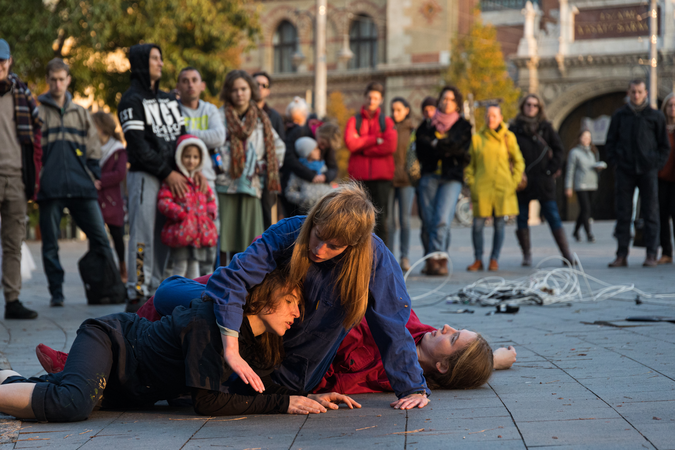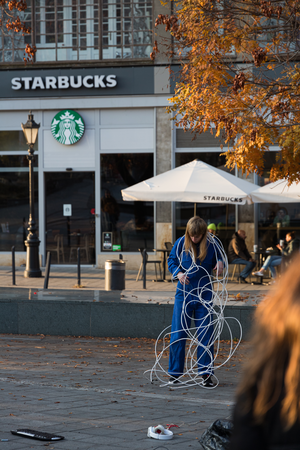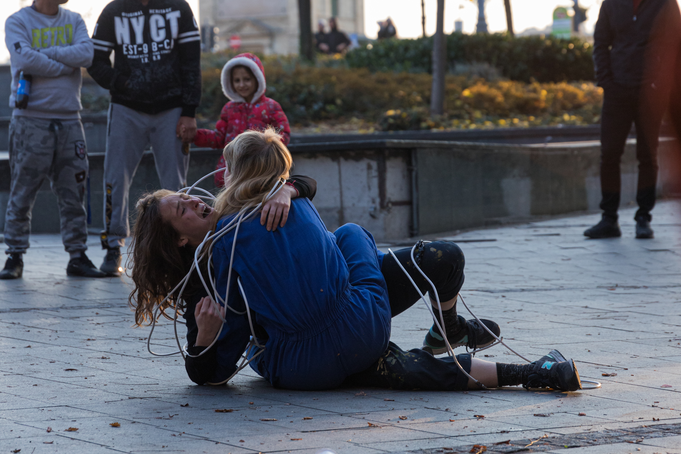i had two performances this semester, both were structured improvisations. I have decided to use the warmup before these as well, to see if it helps with pre-performance anxiety.
The first performance was outdoors, so we danced mostly for passers-by, people we did not know. I felt comfortable with what we were doing, it was well rehearsed, so I was excited to perform. The critical part of the performance was the first few minutes when I felt a bit nervous, but I got over that feeling soon, and enjoyed the rest of performing. This reflects Buss' theory of stage fright, who also states that anxiety peaks in the first one-two minutes of the performance (Ortiz 1988:3). My reflection afterwards was positive: I felt the event went well. I was in a good mood that day, quite focused, and nothing happened during the performance that distracted me.
The second performance was indoors, in front of friends and people we knew. The fact that I knew more than half of the audience made me quite anxious already before we started, especially as I had somebody there whom I did not have a good relationship with at the time. The material we were about to perform was also less rehearsed. My mind was busy with thoughts of what people might think about me, and unfortunately I did not manage to defeat this negativity. I constantly felt judged even if in reality I was not, and this feeling lasted throughout the whole performance. I acknowledged these negative emotions before stepping on stage, also thanks to the warmup which made me realise them, however I could not overcome those. As such, this performance experience was way worse than the previous one, despite the fact that I did the warmup both times.
Even though the warmup did not help me in a practical way in these situations, I realised how much my experience depends upon the circumstances, regardless of being mentally prepared for performing or not. I also realised that I could probably handle my emotions better if I had more experience in performing, so that I could get used to dancing in front of any audience the way I got used to the dance class I started taking in November. I believe if I gained some routine in performing, I could also handle worse performance situations more easily.
There were no significant differences between classes before which I used the warmup, and before those that I did not. I have done 8 classes with the warmup and the same amount without, between the 1st of November and the 22nd of December 2021.
In general, I felt tired before each class (since it started at 9 in the morning), and more energised afterwards. I realised that I am very easily distractable during classes, and that a lot of different things can irritate me. Some examples I noted down for this question are when I wear uncomfortable training clothes, stand too much in the front of the room, or am surrounded by people who seem to compete too much with the others (or, better to say, I perceive them like that). The latter example occured the most often among my answers, therefore I started wondering if I was thinking too much about what others may think of me and my skills. This, I believe, is a very irrational fear of mine, and the problem probably was not in the room, rather in my thinking. I noticed, however, that I could let go of these distracting thoughts slightly more easily when I did the warmup before class.
The average rates of questions 4, 5 and 6:
With Warmup Without Warmup
4. Performance 3,5 3,3
5. Focus 3,5 3,1
6. Confidence 3,2 3,2
As it can be seen from the data, I felt slightly more focused and better in performing when I used the warmup before classes. I believe that the level of confidence is a more complex aspect, and its improvement requires more mental work than a short warmup sequence. As stated by Boyce, mindfulness is not meant to "fix you" (Mindful Communications & Such, 2022). Moreover, even if it seems to be a positive result in favor of the warmup, I am not sure if it was the effect of the warmup, or my mood was simply different in Monday classes. It is hard to detect what caused the difference.
Another important realisation I made was that throughout these eight weeks I got more and more used to the classes I attended: the style of the teacher, the structure of the class and some other dancers who attended regularly like me. Consequently, my answers became more positive week by week, regardless of whether I used the warmup or not. As Scott mentions in her study about stage fright, performing can become a routine, and consequently the symptoms of anxiety gradually become lighter in performance situations (Scott 2017:727). I believe that getting used to the classes helped me more significantly than using the warmup.
A few weeks after I started doing my mindfulness warmup before dance classes, I started doing fine art modeling as a job. I felt that modeling could be a great challenge for me, as I needed to present my body for an audience in a way I never did before - staying still, and naked. I realised that I was experiencing anxiety before modeling in a similar way as before other performance situations. As such, I started to do the warmup even during modeling. I was curious to see if it could be of any help in that situation. Since each session took three hours in which I could not do anything except staying still, I often did the warmup multiple times when I got bored of my stream of thought. It did not specifically help with my anxiety as that rather passed by time - I just got used to being observed. However, doing the exercises was a good way for me to not get really lost in my thoughts, as my mind was very active despite I was not moving physically. Doing the warmup occasionally helped me to "get out of my head", and made modeling a more relaxing, meditative experience. I also realised that my fear originates from a different place as the one I feel before dancing. While it is the same stage fright in its principles, I am afraid of my skills and movements being judged by others when dancing, while before a modeling session I am nervous how the students will perceive my body. For some reason, I can overcome my fear in modeling sessions very quickly and much more easily, compared to a performance situation.
Recently I started doing the warmup before studying, too, as it prepares my mind very effectively to stay concentrated on a topic. Overall, this warmup did not solve any of my problems (even if I was hoping for that a bit), but I had some good experiences with using it. I also think that the fact I started utilising it in other areas of my life proves that I managed to create a set that is enjoyable to a certain extent.
A longer research period could help in identifying the effects of the warmup. The questions of the questionnaire could also be revised, so that they might provide more specific answers. As the research led to the hypothesis that (for me) gaining routine in performing could be more helpful than this mental preparation, I would continue the research by challenging this idea. Since I do not know how frequently I should perform to gain a certain routine, I would start by performing only once or twice in a month, then increasing this number to see if there is any difference. Of course, this research would be difficult to conduct, as I would need a different audience in all performances, too. Moreover, it would be necessary to do different performances, as my aim is not to get used to performing a certain piece, but getting used to the routine of performing. I would also question what aspects of the performance bother me, similarly to the previous questionnaire, but more in detail, so that it could give a clearer picture of the things which make me feel uncomfortable.
I believe that mindfulness is a great method worth practicing, as I had some positive experiences with it throughout this research. It mostly helped me to stay focused on my tasks, and sometimes to keep calm, too. However, I think I expected a bit too much from it, even though mindfulness only cannot fix problems, as stated before. Performance anxiety is a complex matter which requires more thorough research. I chose Buss' theory as I could personally relate to the idea that the first few minutes of a performance is the hardest: after that, I either overcome my fear, or get stuck there for the whole performance. I was interested to read about Scott's theory of the two-sided self, involving a self-critical me, and another me who enjoys performing. My experience is defined by which "self" I allow to be more dominant - yet it is really hard to control them. In any case of stage fright, there is a fear of external judgement at the core. I have no idea how I developed such fear, but questioning its origins through therapeutic methods might help in realising. At the same time, I think that gaining a routine in performing could provide a simple and practical solution to my problem, too.


